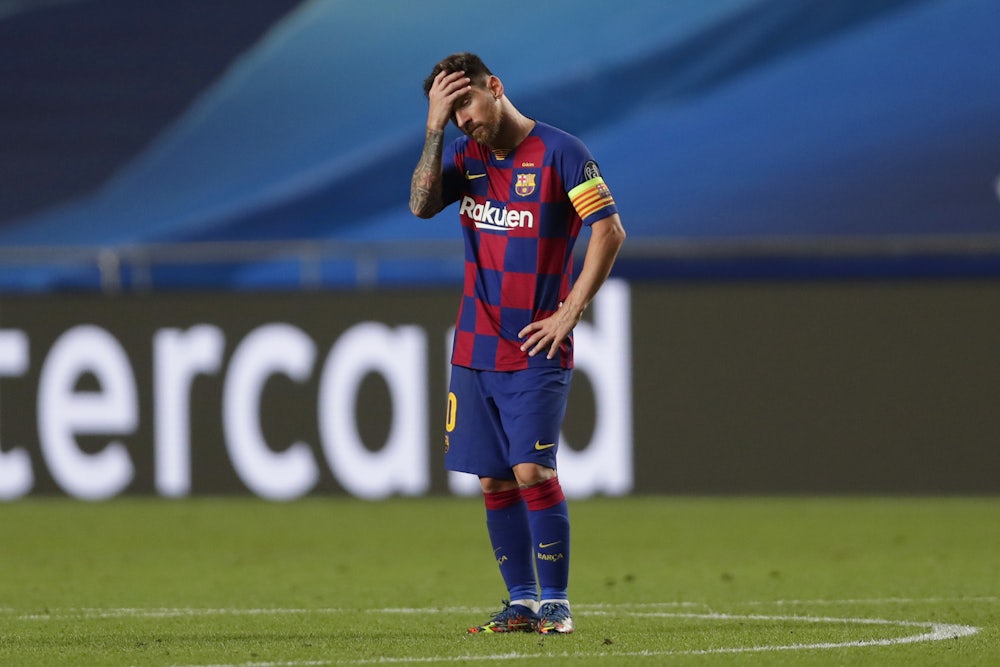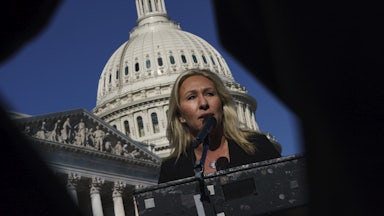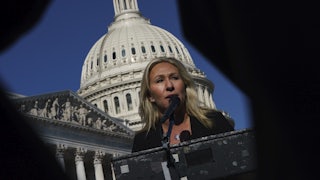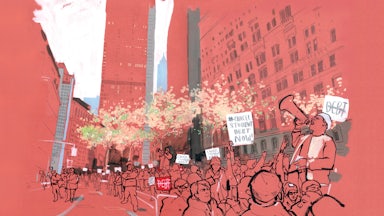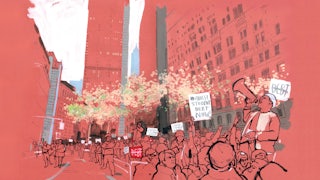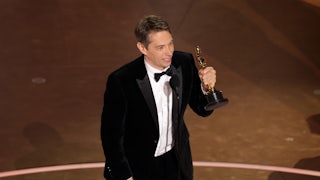Leicester City’s 2016 Premier League title is the greatest sporting achievement of my lifetime, and I’m not sure it’s really close. Leicester City had been in the third division of English soccer less than a decade earlier; its best player, a diminutive defensive midfielder, had been playing in France’s second only two years before. But in 2016, it did the impossible, besting the giants of English soccer (Manchester United, Liverpool, Arsenal); its oil-funded nouveaux riches (Manchester City, Chelsea); and also Tottenham to win the title by a staggering 10 points.
In the breathless words of verbose commentators, this was a Cinderella story that captured the essence of English soccer, and, by extension, the then-24-year-old English Premier League. Anything can happen on a rainy night in Stoke, as the saying goes, or a blustery one in Leicester. You watch the Premier League because impossible things happen all the time. Newly promoted Norwich take down champions Manchester City; Aston Villa demolish the defending champions Liverpool. You watch week after week because you never know what might happen.
This is all bullshit, of course. The Premier League was set up by a handful of rich clubs and a Rupert Murdoch–owned broadcast network in 1992 basically to make sure that a team like Leicester City never won again. It has, more or less, worked that way ever since. Blackburn Rovers won it once, in 1994, thanks to a spending bonanza that eventually destroyed the team. Leicester, of course, won it in 2016. Other than those two exceptions, the title has been won by its five richest clubs—Manchester United, Chelsea, Arsenal, Manchester City, and Liverpool—every single season. And by appearing at or near the top of the table every season, those clubs dominate English representation in the European continent’s premier competition, the Union of European Football Associations, or UEFA, Champions League, which, as its name suggests, features the champions and runners-up of every domestic league.
In the wake of the shambolic, outrageous announcement of a new European Super League—which would essentially replace the Champions League—I’ve been thinking back to Leicester’s improbable 2016 victory. In the midst of a power grab by 12 of Europe’s largest and richest (though not necessarily the best-run or most successful) clubs, there is a temptation to romanticize the existing structures of European soccer, whether they be national leagues or UEFA. But these structures have long been set up to limit competition and make the rich richer. Leicester was never meant to win and, once it did, the richest clubs saw its victory as an affront that should be prevented from ever happening again.
The Champions League is playing out as scripted: Manchester City, Chelsea, Paris Saint-Germain, and Real Madrid (all but PSG are “founding members” of the Super League) are semifinalists this year—no underdogs here. While much is being made of the fact that four of the Premier League’s Super League founding members may not qualify for the Champions League next year, it still remains possible that the season will end with Manchester City, Manchester United, Chelsea, and Liverpool in the top four, as is often the case. While the banners displayed on the streets of Europe reading “Created by the poor, stolen by the rich” tug at my heart, the rich stole the sport a long time ago.
All of this has understandably led to cynicism in some corners. The sport is corrupt and probably irredeemably compromised by hedge funds, oil barons, and human rights–abusing petrostates. But the Super League is still an outrage and a mockery of the competitive spirit that has at least theoretically underpinned soccer for generations. It’s also a revealing, Covid-era power grab. Faced with an unprecedented financial catastrophe and a profound opportunity for change, the wealthiest and most powerful have decided that controlling nearly everything isn’t enough. A team like Leicester City had an infinitesimal chance of glory before—better make that nil now. Only total control will do.
The clubs may very well be undone by their own hubris, though given all the power and wealth they possess, it’s understandable why they thought they could get away with it. Forty-eight hours after it was first announced, what stands out most about the proposed European Super League is how poorly thought through it is. It is a cocktail-napkin sketch meant to replace a structure that has guided European soccer for decades. Everyone seems to hate it. Everyone, that is, except for its shameless and cynical creators.
The Super League would guarantee spots in European competition—currently reserved for the champions and near-champions of their respective leagues—to 15 of the largest and most financially successful clubs in Europe, a group that so far includes Real Madrid, Barcelona, Atletico Madrid, Manchester United, Manchester City, Liverpool, Chelsea, Arsenal, Tottenham, Inter, AC Milan, and Juventus. Five teams will “earn” a rotating spot in the league every year, though it’s still unclear how they will do so. A lot is still unknown, including the identity of the three remaining permanent teams.
Fans almost universally hate it, not only because it makes a flawed product worse, but because it’s in basic violation of the competitive principles that make soccer interesting. The race for placement in the Champions League is integral to the soccer season—at the moment, Leicester and West Ham are in qualification placements in England, for instance, but won’t be playing in a Super League (perhaps the big clubs are really just afraid of a resurgent Jesse Lingard).
Tottenham, meanwhile, is in seventh place and literally fired its manager on Monday; Arsenal, a basket case, is in tenth, and appears to be in the midst of a rebuild that will take years. Ex-players have been particularly vocal, with Gary Lineker and Jamie Carragher blasting the move on English television. Players and managers have been understandably more cautious but still overwhelmingly negative. Ahead of Monday’s draw with Leeds United, Liverpool’s manager, Jurgen Klopp, and captain, James Milner, criticized the Super League—though with a weariness that comes from knowing they will be asked about it again and again over the coming months.
The clubs that weren’t included hate it, too, and not just the small ones that couldn’t dream of European competition anyway. PSG and Bayern Munich, which are basically required for such a gambit to succeed, are vocally opposing it (albeit for political reasons rather than moral ones—PSG’s ownership has close ties to UEFA, and Germany’s unique, fan-based ownership structure creates a sizable hurdle for the executives of Bayern and Borussia Dortmund to strike out on their own).
The implications of a walled-off league are only just being realized, but they would profoundly destabilize the existing national leagues. Without the race to qualify for the Champions League, there will be little reason to tune in to most games—Manchester City and Inter Milan, for instance, have had their respective domestic titles sewn up since February. The end result of a Super League would be the diminishment of every national league in Europe, all of which would suddenly be playing for much lower stakes.
The Super League itself, by featuring virtually the same teams every year, would also be a shadow of the Champions League, however flawed it may currently be. You may not see another Ajax team like the one in 2019, which made it to the Champions League semifinals, let alone the majestic one from 1995 that featured nearly a whole squad of future legends. There would be no Porto winning the league, as it did in 2004, while fans may never discover the next Andriy Schevchenko, who burst onto the world stage playing for the lowly Dynamo Kyiv in the Champions League.
The 12 breakaway clubs surely knew this going in—there’s a reason that they apparently did not tell anyone about it, including their managers and players. They just didn’t care. These clubs looked at a global pandemic that had ravaged their finances and saw an opportunity to further monopolize their power so they would never have to worry about losing money ever again. They could strong-arm not just their respective leagues and soccer’s flawed and fantastically corrupt governing bodies, but the nations they play in.
None of this was being done to make soccer better—and, in fact, what we know about the Super League would almost certainly make it worse. It was being done because global brands wanted to remove the tiny sliver of risk that still threatened their bottom lines. And being global brands, they believed they could get away with it. No one is filling a bar at 8 a.m. to watch Southampton play Burnley, after all. Their audiences will follow them, however grudgingly, the thinking went.
Soccer’s defining trait—its deep connection to community—was already fraying under billions of dollars in transfer fees and television distribution deals. The Super League is both an abomination and a recognition of what soccer is now. The owners of soccer clubs, whether they be American goons like Stan Kroenke or sovereign wealth funds run by human rights abusers, already represented the worst of global capitalism. For the hedge funds and tycoons who own clubs, what happens on the field is tertiary.
The irony of this is that, if this proposal is blocked, it may very well be thanks to arguably even more powerful and cartoonishly evil entities. Without a television sponsor, the Super League will go nowhere. The owners of the 12 clubs surely hoped they could enlist tech companies to create a bidding war. In the wake of the uproar that followed the announcement, however, Amazon appeared to announce that it would have nothing to do with such a league. This is the way the wind is blowing: P.R. for the league is so bad at the moment, no one wants to be seen propping it up.
Even if the league fails, these clubs have already gotten much of what they want. UEFA has announced changes to the Champions League that reward rich clubs and punish everyone else. These clubs, moreover, are shameless and will almost certainly try something like this again if they fail. This is how global soccer works now. The big clubs win, and everyone else loses.
